Some places are built to impress. Others are built to serve. But once in a lifetime, you come across a place that was built to remember you. Welcome to Via Recta Hotel.
Set just steps away from Bab Sharqi, the Eastern Gate of Old Damascus, this house-turned-boutique-hotel doesn’t just offer a bed and breakfast—it offers a story. A deeply human one. A story of broken tiles, blooming roses, glowing lamps, ancient wood, and people who still treat hospitality like a sacred ritual. And it all begins with a man named George Bitar.
Mosaic: The Art of Wholeness
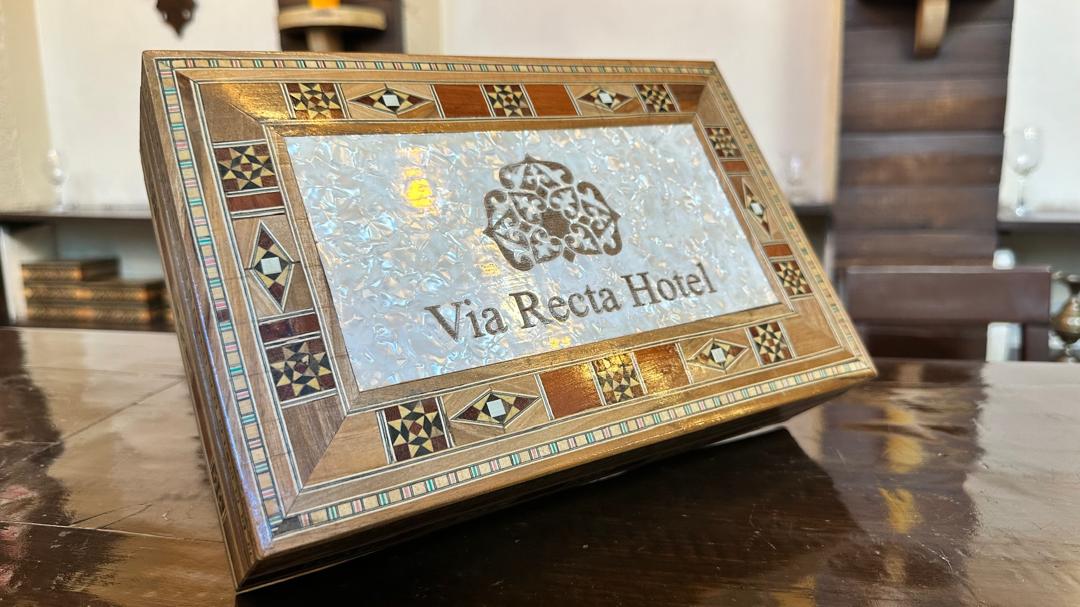
Before Via Recta became a hotel, it was George Bitar’s home. George wasn’t a hotelier or a businessman. He was a Damascene artisan, one of the pioneers of the wood mosaic revival movement in Syria. At a time when others saw rubble and waste, George saw art. He would roam through markets and abandoned sites, collecting broken stones, shattered tiles, and leftover wood. And piece by piece, he turned them into beauty. He didn’t just practice mosaic. He lived it. For George, it was a philosophy: no matter how broken something is, it can always be made whole again. And that belief flowed into every table, wall, floor, and doorway in this house. Today, his legacy is alive in the very bones of Via Recta hotel. And when you stay here, you don’t just rest your head. You become part of the mosaic.
A Courtyard That Breathes
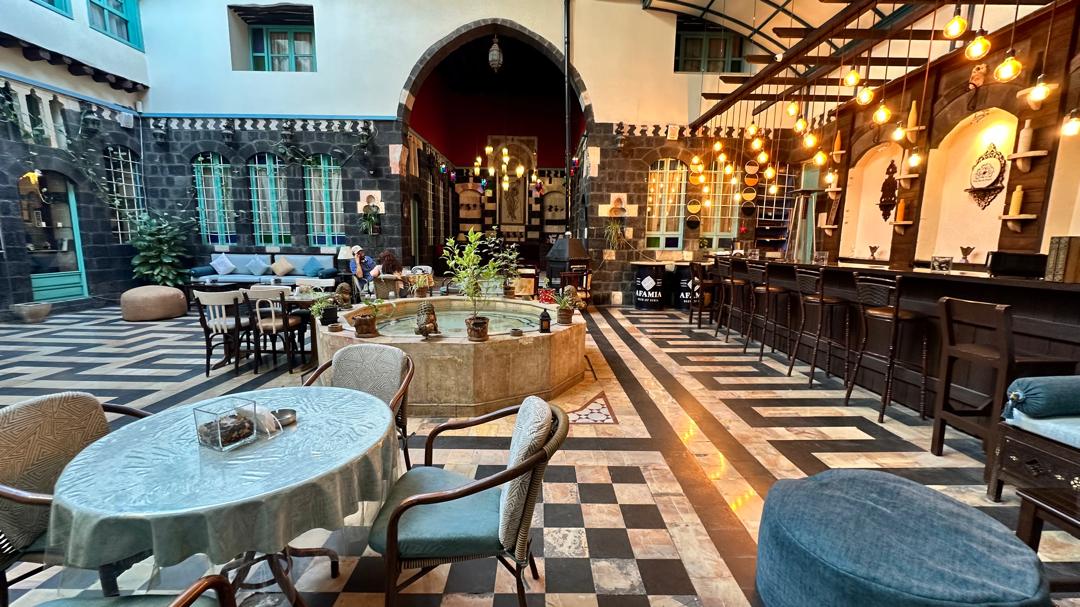
Step through the turquoise doors and you’re no longer on a street. You’re in a memory. The central courtyard is classic Damascene design: an open-air space with a glass ceiling, sunlight filtering through, vines cascading from upper windows, and an octagonal fountain that glistens in the middle like a secret. The floors are a work of art—marble patterns in black, peach, and white—as if they’re trying to guide your footsteps. Brass lamps, handcrafted furniture, soft cushions, and lion statues quietly guard the edges of the fountain. Everything invites you to sit, breathe, slow down. And just as you do—a tray arrives.
Guest Lounge & Dining Area
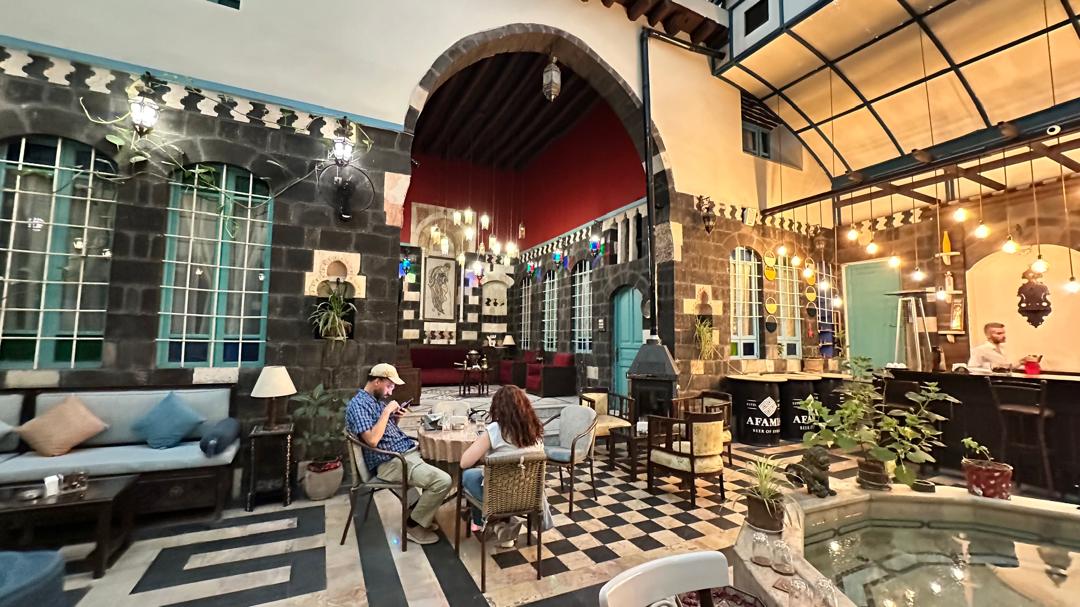
Tables and chairs are arranged around the courtyard, making it the perfect communal breakfast space, café-style sitting area, or casual restaurant setting. The atmosphere is relaxed, inviting, and deeply personal. The floors alternate in bold labyrinthine black-and-stone marble patterns, and the hanging lights above the coffee bar glow like a constellation of memories—blending vintage Damascus with contemporary warmth. Ornate inlaid furniture, engraved copper lamps, and carved mashrabiya woodwork line the walls. Every chair, table, and shelf is not just functional but meaningful. You’ll notice the small touches too: the “Mosaic Suit” nameplate framed in Syrian ceramic and mother-of-pearl, or the embroidered Via Recta logo mounted on carved wood. Even the bar corner, stocked with herbal teas, Damascene soaps, and local handmade products, feels more like a cozy little souk than a hotel counter.
Suites with Names, Not Numbers
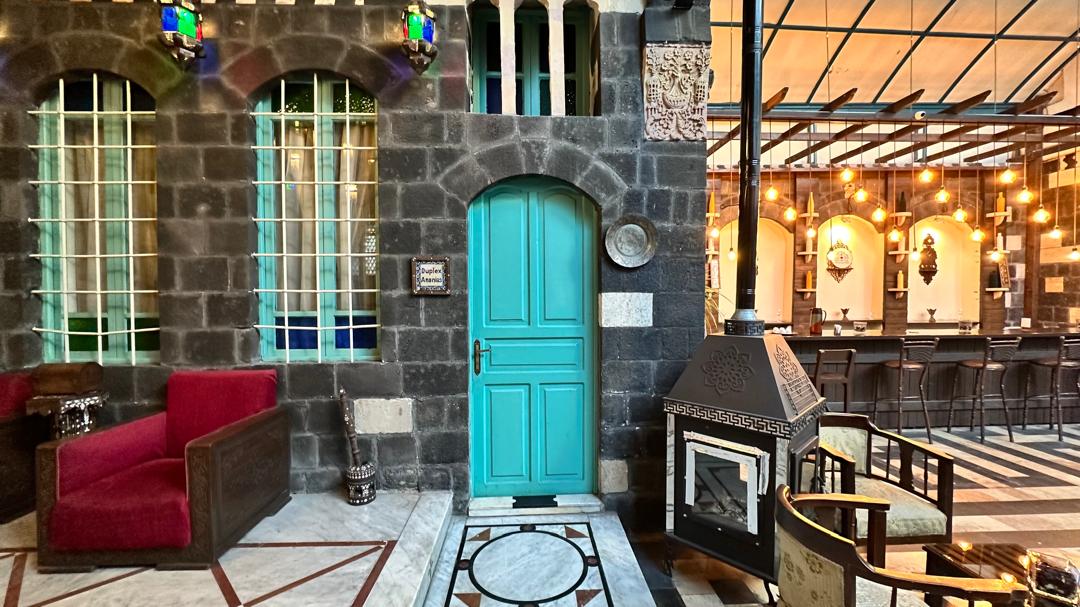
Via Recta doesn’t just give you a place to sleep. It gives you a space with character and soul. One suite is labeled “Mosaic Suit”, named not for show, but for what it holds inside—intricate floor work and décor inspired by mosaic tradition. Rooms upstairs are accessible via a traditional wooden staircase and overlook the courtyard like a private gallery. Vines spill from windows, soft light filters in, and the view gives you the sense that you’re part of something living.
Self-Service Soul
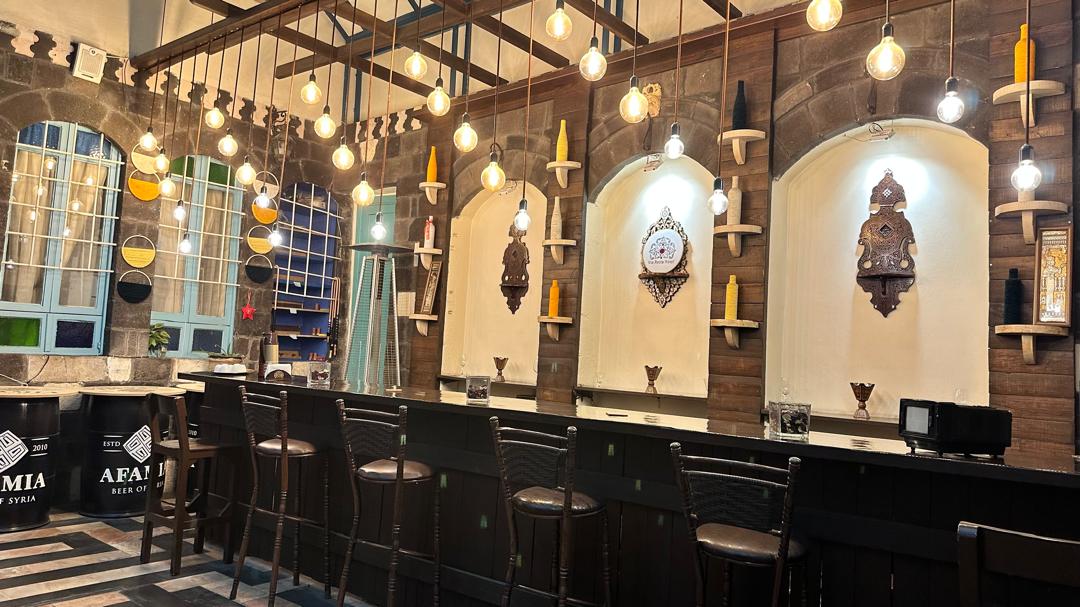
Along one wall is a self-service bar where guests can help themselves to cold drinks, herbal infusions, Turkish coffee, or a light snack. Everything is arranged with care, including locally made soaps and oils. There are no barriers. No cold buffet stations. Just trust, warmth, and the feeling that this house is your house. Whether you’re a traveler passing through for a weekend or a writer settling in for a month, Via Recta never makes you feel like a guest. It makes you feel like you’ve always belonged.
Rose in a Glass: The Damascene Welcome
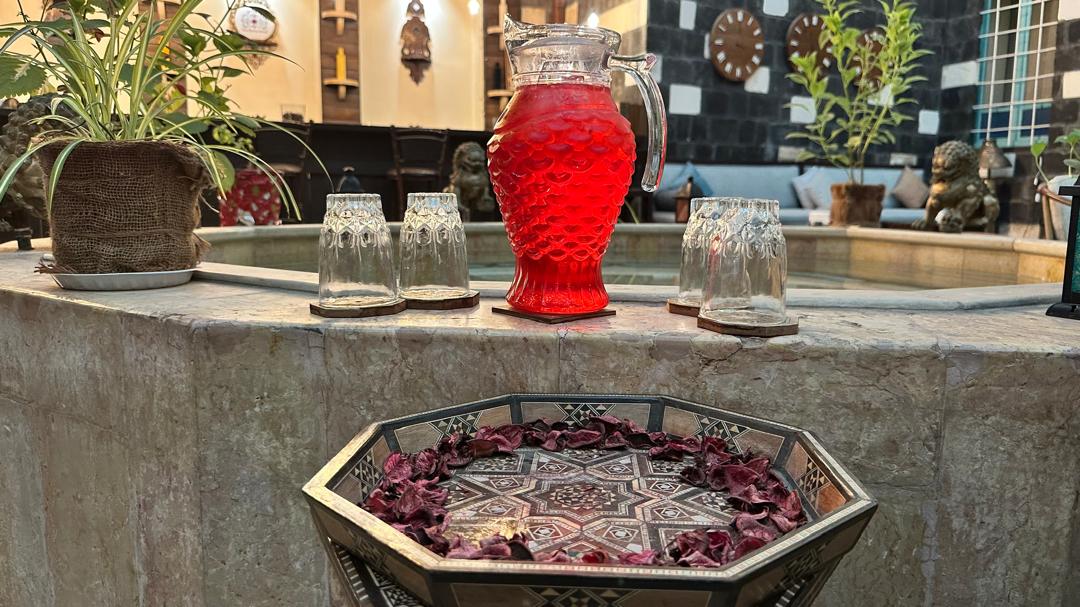
A single glass of chilled rose drink rests on an inlaid mosaic tray. Around it, dried petals form a crown. It isn’t just beautiful. It means something. This is Sharab Ward – the Damascene rose water drink. A centuries-old tradition, especially served during spring, the season of the Damask rose. In every old Damascene house, this was the first act of hospitality. It cooled your lips, calmed your heart, and welcomed you without a single word. Via Recta still offers this drink with love. And the moment you sip it, you feel it: You’re no longer a guest. You’re home.
The Iwan: Where Time Pauses
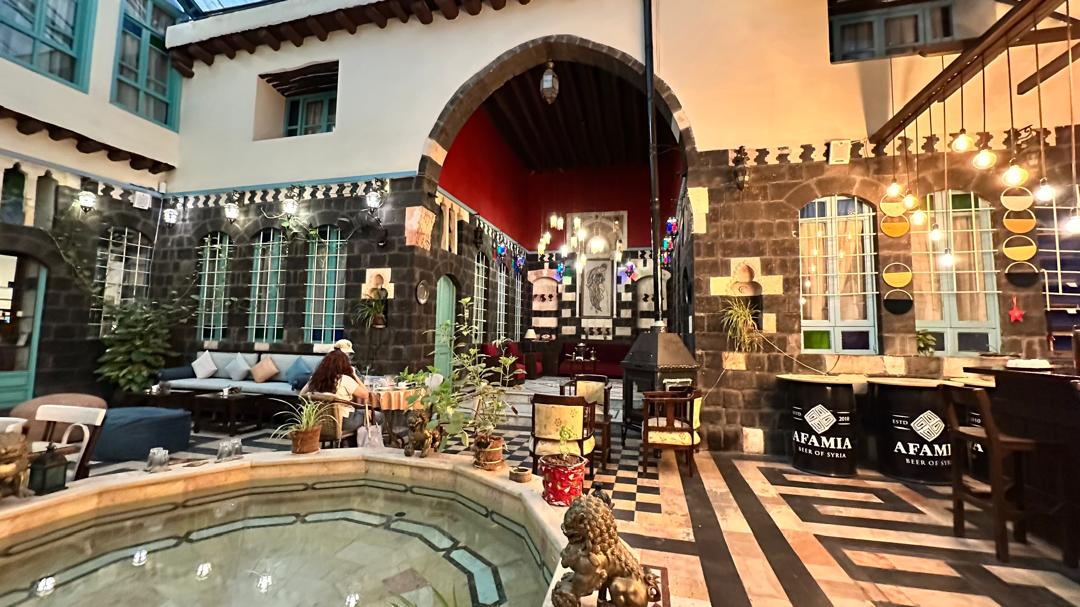
The courtyard opens into a grand arch, leading to the iwan — a high-ceilinged traditional reception room that sits like a jewel box behind stone walls. Red velvet cushions. Colorful stained-glass lanterns. A mosaic mural. Hand-carved woodwork. Alcoves and nooks and silence. This is where families gathered for tea, poetry, or storytelling. Today, it’s where guests come to write, think, or simply feel the presence of something eternal.
The Rooms: Sleeping in a Story
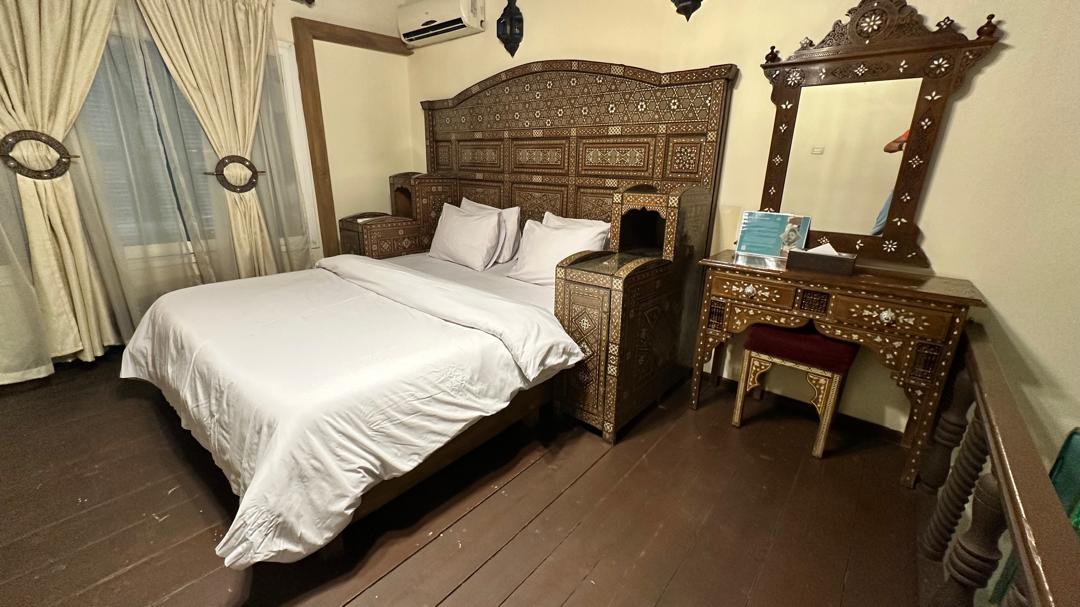
Upstairs or off the courtyard, you’ll find the rooms. Each is different, but all share the same warmth and detail. Wooden beam ceilings. Handmade carpets. Vintage mirrors. Mosaic tables and antique chairs. But one room holds a treasure: A bed crafted by one of George Bitar’s students, believed to be the oldest mosaic-inlaid bed still in use in Damascus. Its headboard is a masterpiece of pearl and wood, glowing softly under warm lamps. Paired with a handcrafted vanity table, it feels like something out of a fairytale—but solid, real, and deeply Syrian. These aren’t just rooms. They’re chapters.
The Lamps That Whisper
You’ll see them everywhere—hanging in the iwan, in the bedrooms, beside the staircases. Hand-cut colored glass lamps, glowing in reds, greens, blues, and ambers. Each casts a unique shadow. Each changes with the time of day. They don’t just light the room. They warm the memory.
The People Who Keep the Mosaic Alive
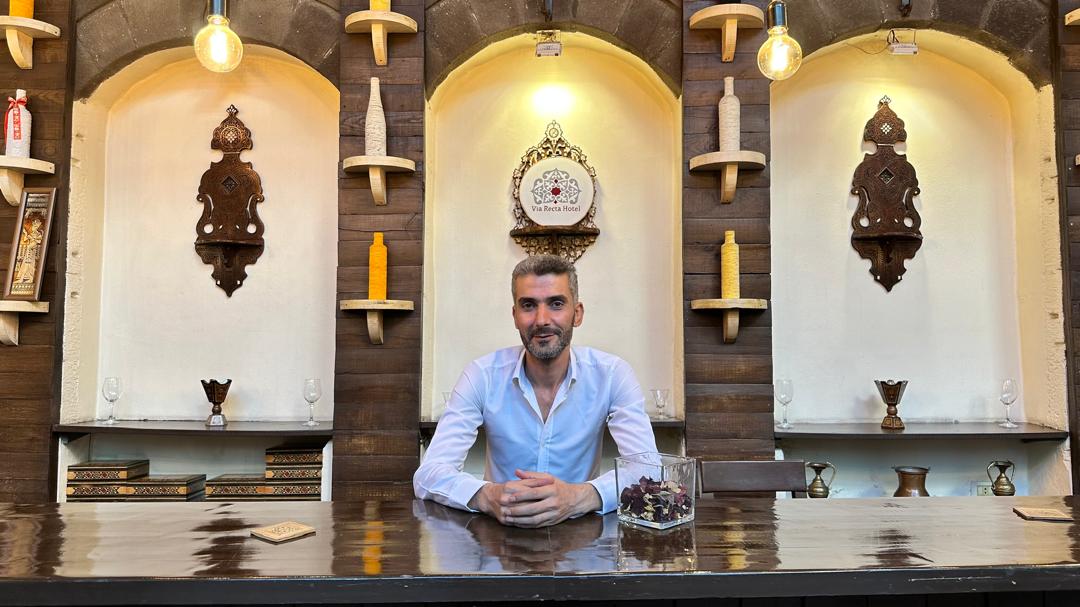
What truly makes Via Recta unforgettable is its people. From the moment you arrive, you’re met with real smiles, kind eyes, and warm hands. The team here is more than staff. They’re caretakers of legacy. They make rose drink. They fluff your pillow. They guide you to the best falafel. They talk to you like a neighbor, not a customer. In a world that’s grown cold with automation, this place reminds you what it means to be human again.
Modern Comfort, Ancient Charm
Via Recta is old, yes. But not outdated. Behind the charm is comfort:
- Fast WiFi throughout the house.
- 24/7 electricity (yes, really).
- Air conditioning in all rooms.
- Hot water around the clock.
- Heating for cozy winters.
- Modern private bathrooms attached to each room. Every piece of your stay is thought through. You feel the history, but you never miss a beat of modern life.
A Location Like No Other
Via Recta sits in Bab Sharqi, one of the liveliest and most character-filled corners of Old Damascus. Just outside the door are cobblestone alleys filled with:
- Bars and nightlife
- Cafes with arak and live oud music
- Ice cream stands and falafel joints
- Boutiques, bookshops, and antiques
- Churches, mosques, and Roman arches
The street is alive until midnight. Shops stay open late. The smells of grilled meats, spices, and jasmine drift through the air. You don’t need a car. You don’t need directions. Everything is within reach. And when the day winds down, you return to Via Recta not like you’re heading back to a room—but like you’re returning to your own secret world.
Why This House Feels Different
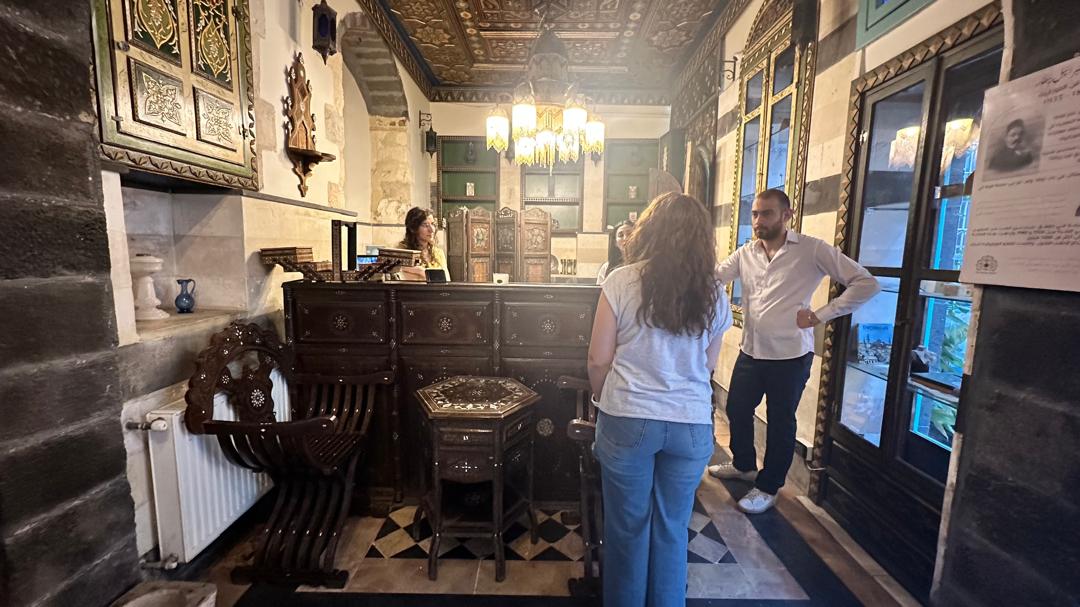
It’s hard to put into words what makes Via Recta so unforgettable. It’s not luxury in the way most hotels define it. It’s something else. It’s the balance of beauty and memory. It’s the way the past wraps gently around you. It’s a place where you’re not just seen. You’re felt. George Bitar built this home with love. His family preserved it with care. His students filled it with craft. And today, his spirit greets you with a glass of rose water and a place to rest.
Final Word: Don’t Just Visit Damascus. Feel It.
If you want marble lobbies, elevators, and cold perfection, there are other hotels. But if you want to feel the real Damascus—to sleep in its arms, to sip its soul, to be remembered long after you leave—then come to Via Recta. Come sit in the courtyard. Listen to the fountain. Watch the vines dance in the light. Let the lamps glow over your dinner. And when you close your eyes at night, know this: You’re not a guest here. You are part of the mosaic. Welcome to Via Recta Hotel. The house that remembers you.
